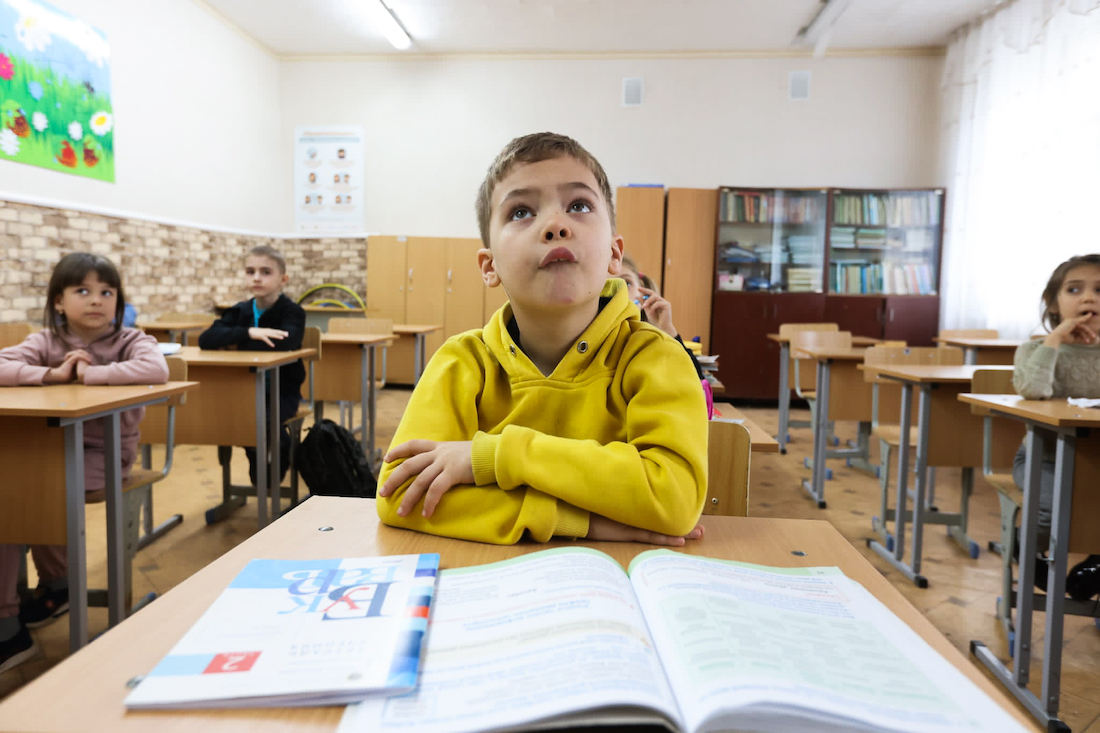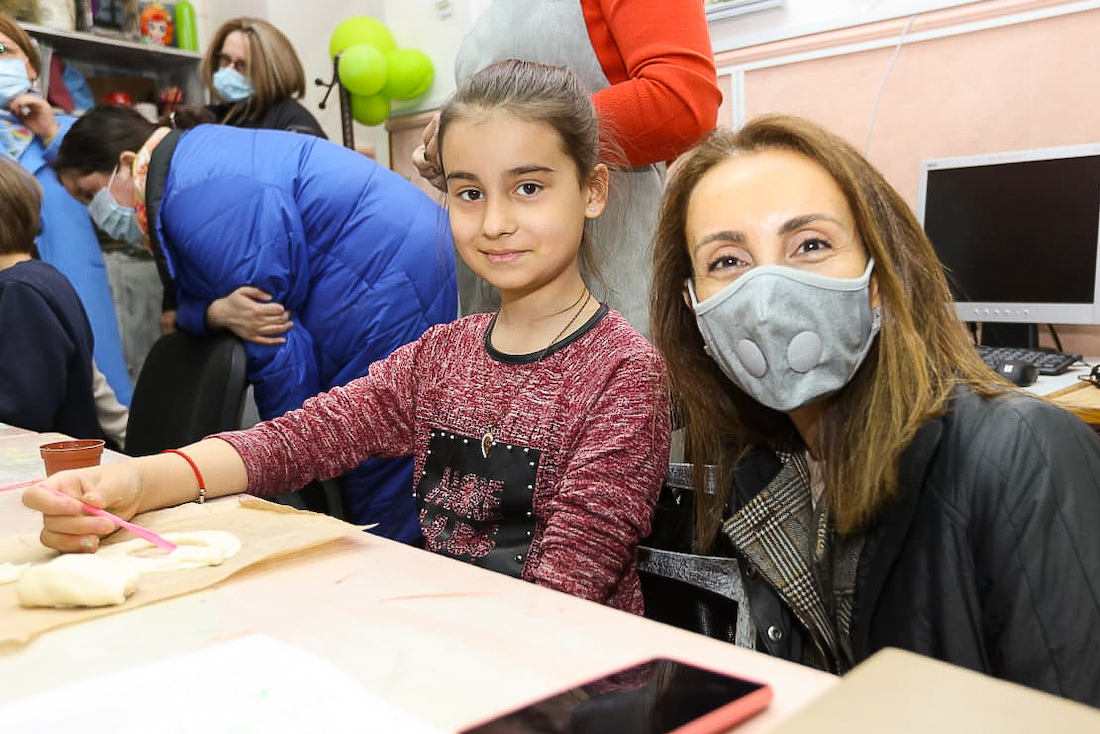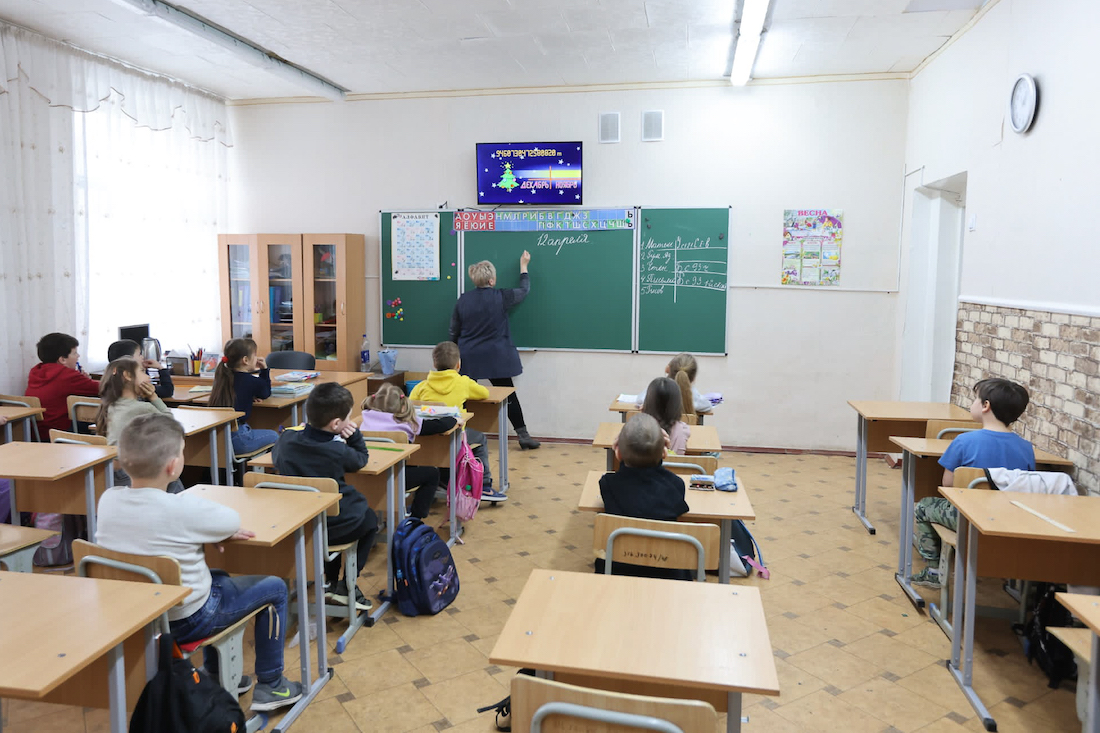Traumatised and displaced … but Ukrainian children are determined to continue their education

A Q&A with Theirworld’s Maysa Jalbout, who was part of a UN mission to Moldova to find out how refugee children can continue to learn and be supported.
Theirworld was part of a mission to Moldova to gain a better insight into the unfolding Ukrainian refugee crisis and find ways to ensure every affected child has access to education and psychosocial support.
Organised by Education Cannot Wait – the fund for education in emergencies – and hosted by UNICEF Moldova, the visit to Ukraine’s neighbour was aimed at supporting the efforts of the Moldovan government and United Nations agencies.
Theirworld was represented by Maysa Jalbout, our Senior Adviser on Education in Emergencies and an international development expert. During the trip last week, she spoke to the BBC and had a live chat with Theirworld President Justin van Fleet (see Twitter link at the end of this story).
When she returned from Moldova, we asked Maysa about what she saw and learned during the mission.

Maysa Jalbout, Theirworld’s Senior Adviser on Education in Emergencies, visits a school at Ungheni, Moldova ©ECW, 2022
Why go to Moldova?
It is one of the poorest countries in Europe and has a small population of 2.6 million. But it has already received more than 270,000 refugees since the attack on Ukraine began in February. These conditions, in addition to the fact that Moldova is not a member of the European Union, make it necessary for the international community to provide support.
What impact has the war had on the education of Ukrainian children?
A devastating impact. More than 2.8 million children are internally displaced and another two million are refugees in neighbouring countries. In addition to experiencing horrific violence, displacement and separation from their families, millions of Ukrainian children have had their education disrupted. Inside Ukraine, more than 700 schools have been destroyed by shelling.
Families now have to make tough choices between choosing to continue their children’s schooling online where it is available and under difficult conditions versus joining a local school in their host country and adapting to a new language and curriculum.
What are the most urgent issues fuelling the education crisis?
It is unlikely that the Ukrainian refugees will be able to return to their communities and schools anytime soon. Even if Ukrainians are able to return more quickly than the average refugee, the education system would need time to recover and rebuild after the damage.
What did you hear from Moldovan government officials?
They expressed their solidarity with the Ukrainian people and their commitment to host them. But they have limited means and require the support of the international community to help integrate refugee children into their schools. Support is needed to strengthen the education system so they are able to cope with hosting a large number of refugee children.

Ukrainian refugee children get a lesson at the Lyceum Aleksandru Puskin School in Ungheni. ©ECW, 2022
Tell us about the children and families you met
The refugee children and families we met had experienced trauma and anxiety of being separated from their homes and loved ones. Yet they were determined to continue their education and pursue a better future, despite the challenges that come with adapting to a new culture, language and curriculum.
Why is education an important part of any humanitarian response?
As a former refugee, I believe the education I received was the crucial factor in giving me a chance at building a new productive life. In the short term, for every refugee child, education is about maintaining hope that they can have a better future. Access to schooling is also an important gateway to receiving social services, psychosocial support and integrating into their new communities.
Is the language barrier a problem for Ukrainian refugees?
It is a major barrier to refugee children integrating into the education systems of host countries. There is some consideration being given (in Moldova and other neighbouring countries) to supporting children who choose to continue to study online in Ukrainian, to offer some classes in Ukrainian and to hire Ukrainian teachers to maintain the language.
How can world leaders respond to this crisis?
As this crisis may carry on for some time, it is imperative that world leaders continue to prioritise supporting refugees and providing the resources needed to meet their needs – especially education, which is currently not receiving enough support.
Leaders need to learn from past experiences but also need to reflect on how the overwhelmingly positive response to the Ukraine refugee crisis and the policies that have been enacted should also be the standard applied for all refugees.
What practical actions can people take to help?
Everyone can help. Some suggestions:
- Donate
- Volunteer in communities hosting refugees
- Host refugee families
Missed the conversation? Catch up here @MaysaJalbout & @justinvanfleet in conversation about why @EduCannotWait for #Ukraine refugee children #Moldova https://t.co/zCK2MA86Qr
— Theirworld (@theirworld) April 13, 2022
We travelled to #Moldova this week to find out how the country is responding to the arrival of 50,000 #Ukraine child #refugees and the urgent need to get them into school.
🎥 Ft. @YasmineSherif1 @EduCannotWait, @AliciaH_1 @FCDOGovUK and Theirworld representative @MaysaJalbout pic.twitter.com/DK81LSIgPE
— Theirworld (@theirworld) April 15, 2022